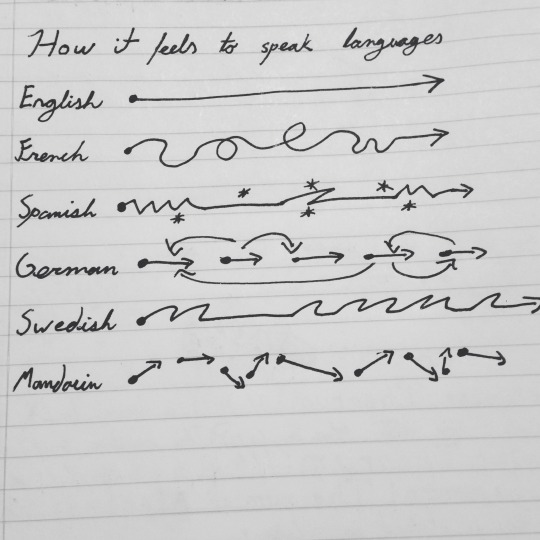Text
Hey guys!!
It’s been so long since I’ve been on this blog-- sorry!
I’m due to start college next month, where I’ll be double-majoring in Spanish and Linguistics with a minor in Mandarin, which will be awesome!
I’m going to try to be on here more often <3
7 notes
·
View notes
Note
hey im really sorry to bother u but i've just started to learn korean and i was wondering if u have any tips on where to start??? and also chinese, i wanna learn chinese but its just so???intimidating??? like there are a million and one characters??? i can speak japanese a bit so i already know some chinese characters but wow there are alot and my brain is like no/
Hey dear, you don’t bother at all!
New things and concepts can be very intimidating. For me as a language learner, it’s very important to know what am I going to face when learning the language. Therefor I suggest you to read about the target language, it’s grammar and what is special about it. Here are some examples for Chinese:
THIS BOOK (very very good resource)
THIS YOUTUBE VIDEO (easy introduction)
THIS ARTICLE
People tend to focus on the hard side of the languages. But isn’t it amazing that Chinese doesn’t have cases? And no verb conjugation?No masculine and feminine? I can’t tell you all the advantages, but watch THIS video to see them.
Basically, first get into the touch with the language. And then you can plan out your studies and how the process of learning it will be. I suggest you buying a good text book. I’ve seen one for Chinese I’ll probably buy, but first I’ll see how my school course is.
Also about Korean, I can definitely suggest you the free PDF book “Korean from Zero”, you can download it HERE. I’m currently working with it and it is amazing, just as the “japanese from zero” books.
Don’t be too scared and just jump into the cold water. I hope this helped.
Many wishes <333
40 notes
·
View notes
Conversation
duolingo: Russian for English speakers coming 17th August!!
everyone in the Tumblr language community: okay... that sounds fake but okay
606 notes
·
View notes
Quote
Tengo necesidad de un poco de soledad y de silencio, tengo necesidad de un sitio para mí.
Simone de Beauvoir - La mujer rota. (via hoja-latas)
2K notes
·
View notes
Video
youtube
Such a wild thing to observe: SKorea has developed so rapidly that our language has become riddled with foreign loanwords that our Northern counterpart can no longer understand - even if we speak the same language.
Excited to see technology being used as a powerful medium to better bridge the growing 70-year gap of our now two distinct cultures.
21K notes
·
View notes
Text
50 Spanish Phrases for Essays
causa de - because of, on account of
a continuación - below, following
a partir de - from the time that, as of
caracterizarse por - to be characterized by
consistir en - to consist of
conviene - it is fitting, suitable, convenient
de hecho - in fact, as a matter of fact
de la perspectiva de - from the perspective of
de veras - really
ejemplificar - to serve as an example
en conexión - in connection
en realidad - really, in fact
es necesario - it is necessary
por ejemplo - for example
por la mayor parte - mostly, for the most part
bien pensado - well thought-out
de verdad - really
de vez en cuando - now and again, (every) once in a while
mejor dicho - more exactly, rather
querer decir - to mean
servir para - to serve to
significar - to signify, to mean
sugerir - to suggest
tanto mejor - so much the better
tener que ver con - to have to do with
todavía - still, yet
al fin y al cabo - in the final analysis, in the end, after all
como consecuencia - as a consequence, as a result, due to
de lo anterior - from the above
después de todo - after all
en breve - in short
en conclusión - in conclusion
en resumen - in conclusion
en todo - all in all
es preciso - must, it is necessary
llevar a cabo - to accomplish
parece que - it seems that
por consiguiente - therefore
por lo tanto - for that reason, therefore
por último - lastly
se ve que - one sees that
al final - in the end, finally
con cuidado - carefully
del punto de vista de - from the point of view of
de modo queso - so that, in such a way that
de nuevo - again
en cambio - on the other hand
mientras tanto - in the meanwhile
por fin - finally
por lo general - generally
3K notes
·
View notes
Note
Is there a partitive case in Spanish???
Not really a case…
Like you have the regular numbers… uno, dos, tres, cuatro, cinco
Then you have the ordinal numbers… primer(a), segundo/a, tercer(a), cuarto/a, quinto/a
And the the partitives which are medio/a “half” or la mitad “a half”, el tercio “one-third”, el octavo “one-eight” / “octave”…
And then basically anything past 10 gets an -avo for partitives.
So… doce = 12, duodécimo/a = twelfth, and el doceavo means “one-twelfth”
Or cien = 100, centésimo/a “hundredth”, and el centavo is “one one-hundredth”… which is why el centavo means “penny” in English. Since 100 pennies = 1 dollar, it’s un centavo 1/100
Spanish doesn’t really do case systems
44 notes
·
View notes
Text
Pinyin Resources
Basics
Introduction to Pinyin
Pīnyīn.info (a guide to the writing of Mandarin Chinese in Romanization)
Pinyin
Pronunciation
Mandarin Chinese Pinyin Chart with Audio (click on the pinyin to hear it pronounced)
Pinyin chart (similar to the first pronunciation link, but you can also see the IPA)
Yoyo Chinese Pinyin Chart (similar to the first pronunciation link, but you can watch video demonstrations of many of the sounds)
Reading
Chinese Annotation Tool (annotates Chinese character with the pinyin and translations)
Chinese Pinyin Phonetic Transcription Converter (converts simplified or traditional characters into IPA or pinyin; does other cool things like highlight HSK levels!)
Writing
Pinyin Editor (allows you to write pinyin directly on your computer)
Pinyin Tone Tool (converts pinyin with numbers into pinyin with tone marks)
Chinese Input Method Editor (converts pinyin to Chinese characters)
397 notes
·
View notes
Text
I haven’t been on a lot at all ugh D:
In other news, I think I might start to study Catalan soon!
3 notes
·
View notes
Text
Some numbers about Duolingo
There are 6,3 times more people learning Irish (882k learners) than there are native speakers of Irish in Ireland (140k speakers);
There are about 16,665,000 people learning German on Duolingo - that is almost the population of Austria and Switzerland combined (16,724,721 people in 2014, according to World Bank)
There are about 39,774,000 people learning Spanish on Duolingo, while the number of native Spanish speakers in Spain is of about 38,352,500 (82% of Spain’s population) according to this report
There are more people learning English (~99,288,600 learners) than the population of the United Kingdom, Australia, Ireland and New Zealand combined (about 97,121,000 people)
1K notes
·
View notes
Text
when i’m drunk my linguistic skills go from being amateurish to thinking my target language is my mother tongue.
929 notes
·
View notes
Text
Sorry for the inactivity, I've been really busy with life and stuff. D: I'll try to regularly be on here by next week!!
1 note
·
View note
Text
Notes from the Italian Duolingo
Duolingo User 1: “"Stasera sceglie lui il ristorante.“ Is there a grammatical reason for it to be “sceglie lui” instead of “lui sceglie?” Or are both correct?
Duolingo User 2: In this order it implies an imperative, so it’s more akin to “let’s let him choose”, while “lui sceglie” is matter-of-fact “he chooses”.
Duolingo User 3: “This is a great brainstorm for a sentence that can be somewhat confusing, so let’s flesh it out:
“Stasera lui sceglie il ristorante.” - Basic structure. He is making the selection and this is a fact. Because of the way simple present works in Italian, you’re right guiletheavenger, in English “will” or “is going to” would work as well.
“Stasera sceglie lui il ristorante.” - Moving the subject pronoun after the verb provides emphasis to who is doing what. That’s the simplest explanation for this strange structure and it works most other times you see it as well: emphasis.
Here are other sentences you might see:
Guido io. I’m driving (not you)
Andiamo noi. We’re going (we can take care of this)
What I believe User 2 was trying to explain is that highlighting lui like this makes it seem similar to the subjunctive or the imperative in that it is not matter-of-fact. You could compare this to another structure: “Che scelga lui” and if you’re familiar with Spanish, “que elija él”. One interpretation of this sentence indicates a wish or desire, just like the imperative and subjunctive, but it’s not the same mood or tense. Remember: verb + subject pronoun is for emphasis.
15 notes
·
View notes




